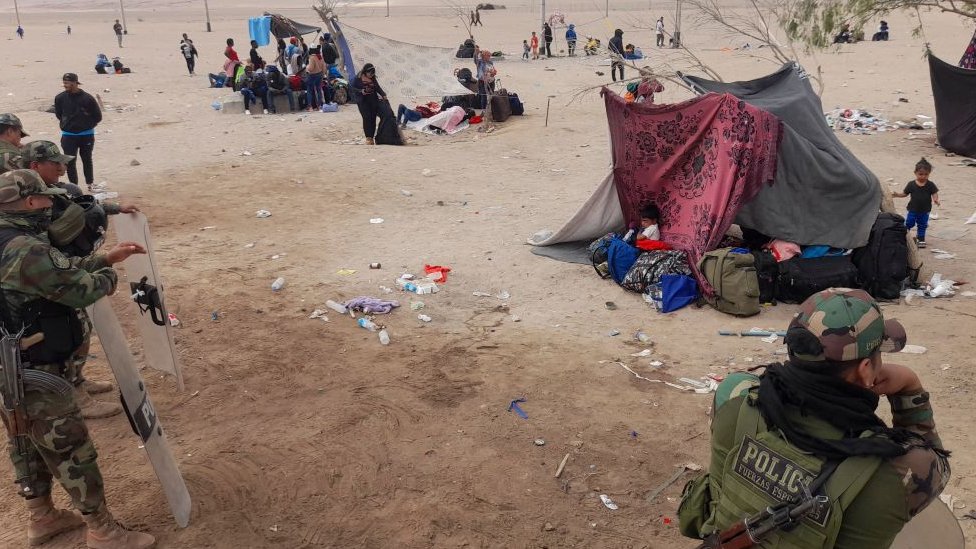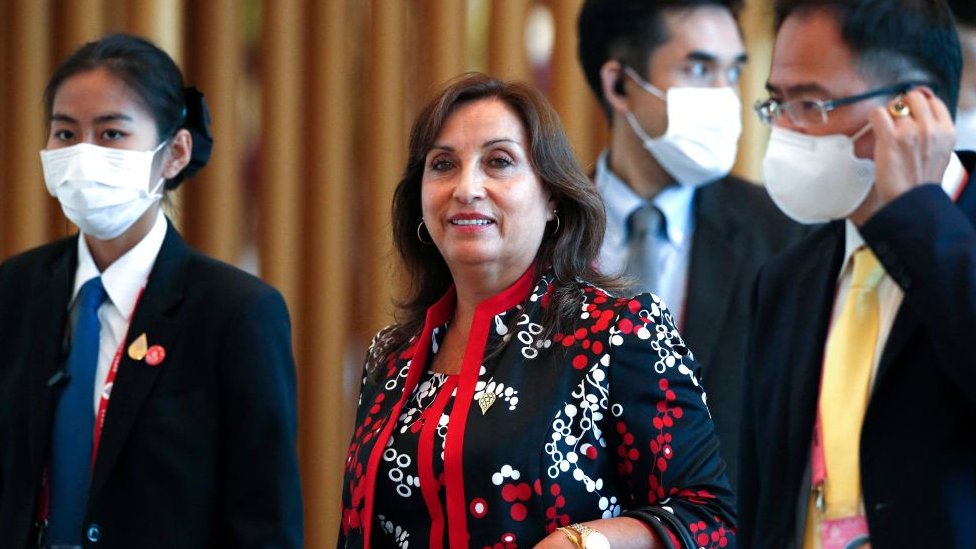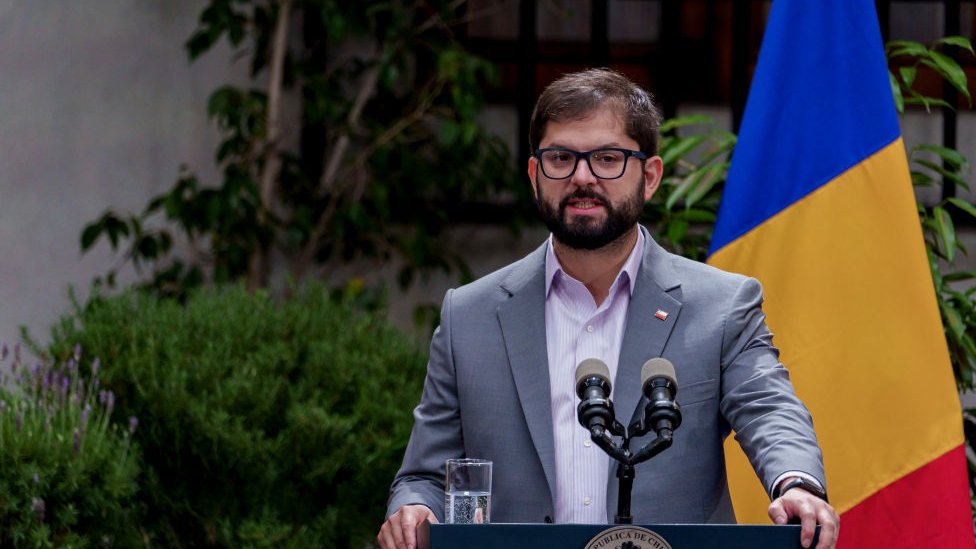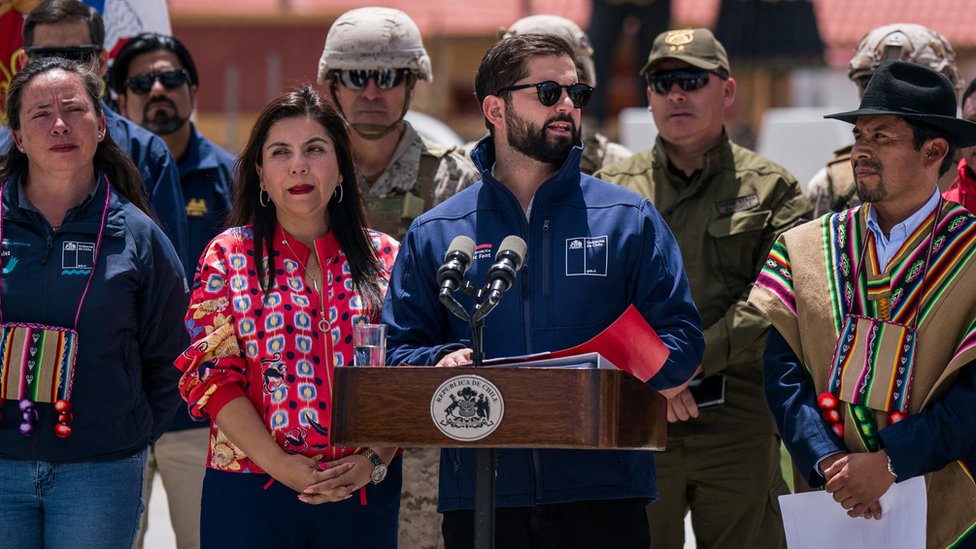This Venezuelan’s claim is echoed among migrants around Tacna, a region of Peru close to the Chilean border known as “Linea de la Concordia”.
from the southern country over the past few days, about 200 people have arrived, among which there are minors, pregnant women and elderly people with aiming to cross Peru.
Without relevant documents Peruvian authorities do not allow them entry andChile does not want to receive them either.
They got stuck.
Some have Chilean visas of various types, others have entered irregularly and only have an identity card from their home country. But they insist that they want to return to their countries.
“Hand on your heart, we don’t want to be in Peru or Chile. We want to be in Venezuela and see our loved ones,” the woman told Chile’s National Television Network (TVN).
According to the UNHCR, the UN refugee agency, most of them are Venezuelans, but there are alsoColombians and Haitians.
“Migration Corridor”
Unable to move forward or backward, many they sleep outdoors.
This place is “very dirty, with a lot of garbage and flies. There are no bathrooms or hydration points. Many children get stomach ache,” explains one report prepared by the Open Assembly of Migrants and Immigrants (AMPRO).
UNHCR notes that in many cases these people “Without food, water, shelter or help sanitation” in youin the zone what is knownTo due to extreme weather conditions.
“What we are told is that for ten years we cannot return to Chile or Peru, we do it. But to wait here for a week, two weeks… I have a son (with me), and I don’t want this for him as a mother. We are between a rock and a hard place,” Venezuelan Yosier Canelon told Reuters.
In her case, she wants to return to her mother. “I have a mother and an aunt whoNo cancer and that’s the third level. My son is Chilean, I want to give life to my son here (in Chile). But if I stay, he won’t meet my mom.”
“No.or have answers from the authorities and it is impossible to go to the windows (immigration office) for the procedure”, says Lorena Zambrano, AMPRO representative in Tarapaca, Chile.



Given the desperation and lack of solutions, in recent days there have been a series of clashes between border police and migrants who blocked the passage of trucks and vehicles on the road to lobby for help.
The AMPRO report denounces that people were “beaten” by security forces.
There are several migrant organizations that they are asking create migration corridor. “This allows them to return home, regardless of their nationality, without registration, and then they can return if they want, respecting the laws of each country,” says Zambrano.
Clash between governments
The situation in the border area between Peru and Chile has several aspects.
On the one hand, the President of Peru, Dina Boluarte, maternity leave in this Wednesday State of emergency on its borders. This will allow the police and military to conduct immigration control operations.
According to the National Statistical Institute (INEI), there are over 1.4 million foreigners in Peru.
These measures will allow us legalize and identify foreigners who are in an illegal situation, and encourage formalities in immigration control and the labor market,” Boluarte said in a statement.
At the same time, also from Peru, they said that the president of Chile, Gabriel Boric, must take control of the borders his country.



The pressure increased even more after it was condemned that the Chilean military helped migrants cross for illegal passage into Peru.
The accusation, aired on América Televisión’s Cuarto Poder program, caused controversy in both countries and prompted the Chilean army to launch an investigation into the matter.
“What is happening on the border between Chile and Peru shows the limits of the space of cooperation between countriesMyra Feddersen, professor at the Adolfo Ibáñez University School of Law and principal investigator at the Millennium MIGRA core, told BBC Mundo.
At all Chilean Foreign Minister Alberto van Claveren assuredor what are they talking abouting With neighboring country for a diplomatic solution to the problem.
“The region has not been able to conclude agreements to solve the migration crisis. Each country acts unilaterally, no one wants to take responsibility. And it won’t be solved if we don’t work together,” adds Feddersen.
Leave and return due to the crisis
In recent years, and as a result of the economic and social crisis that your country is going through, over 7.1 million Venezuelans they emigrated, according to the UN. Their main target was neighboring Colombia, but in search of a better life, they also reached other countries in the region.
One of his destinations was Chile, where, as of 2020, about 500,000 Venezuelans lived, a third of the foreign census.
But now, as is the case with many people stranded on the neighboring border with Peru, They decided to leave the country, led by Gabriel Borich, due to a lack of opportunities and the increasing rigidity of their immigration policy.
According to the Jesuit Service for Migrants (SJM), which has been studying the problem of migration in Chile over the past decade, since 2021 More Venezuelans left than entered the country. In 2021, for example, about 40,000 Venezuelans arrived and more than 70,000 left.



Ignacio (not a name to protect his identity) was one of those who went to Chile and returned.
Ignacio traveled in 2016 in search of a better life. “We couldn’t buy anything in Venezuela, there was nothing”he laments in a conversation with BBC Mundo.
But after 6 years, he decided to return, because economic conditions and his personal situation had changed.
“Rent has increased by 200%, the labor market has suffered. Personally, we had a son who was diagnosed with autism, and we looked for a public school, but we never found a place. And private school is very expensive,” he says.
He also feels that he has changed the image of people. After the 2017 protests people’s attitudes have changed. In addition to the increase in attacks on the street, I was constantly pointed out that I was a foreigner, I was told that I could not conclude that I should leave the country“.
Ignacio he was able to leave by plane thanks to the financial support of his family since immigration procedures were easier in 2016 and he received a residence and work permit a few months after his arrival. But many do not have economic opportunities or travel documents.
More control, more fear
With the arrival of more migrants in Chile in recent years, the government Boric has Iposition strict controls, including the militarization of the northern border of the country since February of this year.
Boric explained that these measures are aimed at “fight head-on with criminal organizations that use these flows and the needs of people to commit crimes such as human trafficking, drug trafficking and arms trafficking“.
For her part, Interior Minister Carolina Toja assured that “Chile has not done for a long time what it should have done to have good control.”
“Not only the military disappeared, but also many other things. There was a lack of personnel, technology, facilities, law schools and a lack of budget,” Toha said as he announced the militarization of the northern Chilean border.
In addition, since mid-April, prosecutors throughout Chile have been ordered to request preventive detention for all foreigners detained for a crime, regardless of its gravity, whose identity cannot be proven.
This was stated by the national prosecutor Angel Valencia. after death VThird cop on duty in less than a month. He said pre-trial detention would be maintained when “the identity of (the detainee) cannot be reliably established by the national media and before can be installed his personality“.



The above completes the series laws passed PParliament that hastens exile migrant administration.
For Patricia Rojas, President of the Association of Venezuelans in Chile, these measures are “an infringement on the rights of migrants” and have the “intent to persecute those who do not have Chilean documents.”
“The narrative set in Chile stigmatizes and criminalizes foreigners by blaming them for structural issues such as security,” Rojas explains to BBC Mundo.
Migration is a major issue for the South American nation. Measures are being taken to adapt integration policies, but also visa application procedures are becoming increasingly complex.
This is, in part, this has led to there being entrances and exits through what they call “unauthorized paths”.
“They refuse permits, the procedures are very long, and they don’t even consider applications for refugee status,” says Feddersen.
“For this reason, many prefer to infiltrate secretly. The problem is that they also cannot resolve their situation, and it is very difficult.”
And now, with the new law on pre-trial detention, the scenario has become even more complicated. “YouThey are afraid of being arrested and deprived of their freedom.”Fedders says.
Irrelevance of documents leads to a series of hardships for these people, for example, the inability to access jobs or formal leases, which opens up a range of abuses.
remember, that you can receive notifications from BBC Mundo. Download the new version of our app and activate them so you don’t miss out on our best content.
Source: La Opinion
Alfred Hart is an accomplished journalist known for his expert analysis and commentary on global affairs. He currently works as a writer at 24 news breaker, where he provides readers with in-depth coverage of the most pressing issues affecting the world today. With a keen insight and a deep understanding of international politics and economics, Alfred’s writing is a must-read for anyone seeking a deeper understanding of the world we live in.
